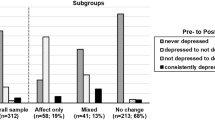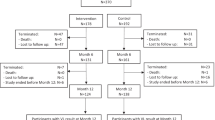Abstract
Little is known about trends in depression at antiretroviral therapy (ART) initiation among people living with HIV (PLHIV) in low- and middle-income countries. We used data from an ongoing cohort of treatment-naïve PLHIV in rural Uganda to estimate secular trends in depression among PLHIV at ART initiation. We fitted linear regression models with depression symptom severity as the outcome variable and year of cohort entry (2005–2012) as the explanatory variable, adjusting for socio-demographic variables and assessing physical health score, body mass index (BMI), and CD4 count as potential mediators of a secular trend in depression symptom severity. There was a statistically significant negative association between year of entry and depression symptom severity, suggesting a 3.1 % relative decline in the mean depression symptom severity score at ART initiation in each year of study recruitment after the first year. This trend remained statistically significant after inclusion of baseline socio-demographic characteristics to the model and appeared to be driven by improved physical health scores, but not CD4 count or BMI.
Resumen
Poco se sabe acerca de las tendencias de la depresión en el inicio de la terapia antirretroviral (TAR) entre las personas que viven con VIH (PVVIH) en los países de bajos y medianos ingresos. Utilizamos datos de una cohorte en curso de PVVIH sin terapia antirretroviral previo de Uganda rural para estimar las tendencias seculares en la depresión entre PVVIH en el inicio del TAR. Hemos implementado modelos de regresión lineal, utilizando como variable de resultado la severidad de los síntomas de depresión y como variable explicativa, el año de entrada cohorte (2005–2012), ajustándolos a variables sociodemográficas y evaluando la puntuación de la salud física, índice de masa corporal (IMC) y el recuento de CD4 como mediadores potenciales de una tendencia secular en la severidad de los síntomas de depresión. Se observó una asociación negativa estadísticamente significativa entre el año de la entrada y la severidad de los síntomas de depresión, lo que sugiere una disminución relativa del 3,1 % en la puntuación media de los síntomas de depresión de gravedad en el inicio del TAR en cada año de la contratación del estudio después del primer año. Esta tendencia se mantuvo estadísticamente significativa después de la inclusión de las características sociodemográficas de base para el modelo y parece que el cambio fue impulsado por la mejora de resultados de salud física, pero no por el recuento de CD4 o IMC.


Similar content being viewed by others
References
Whiteford HA, Degenhardt L, Rehm J, et al. Global burden of disease attributable to mental and substance use disorders: findings from the Global Burden of Disease Study 2010. Lancet. 2013;382:1575–86.
Nebhinani N, Mattoo SK, Wanchu A. Psychiatric morbidity in HIV-positive subjects: a study from India. J Psychosom Res. 2011;70:449–54.
Gaynes BN, Pence BW, Atashili J, O’Donnell J, Kats D, Ndumbe PM. Prevalence and predictors of major depression in HIV-infected patients on antiretroviral therapy in Bamenda, a semi-urban center in Cameroon. PLoS One. 2012;7:e41699.
Kaharuza FM, Bunnell R, Moss S, et al. Depression and CD4 cell count among persons with HIV infection in Uganda. AIDS Behav. 2006;10:S105–11.
Olley BO, Seedat S, Stein DJ. Persistence of psychiatric disorders in a cohort of HIV/AIDS patients in South Africa: a 6-month follow-up study. J Psychosom Res. 2006;61:479–84.
Meade CS, Sikkema KJ. HIV risk behavior among adults with severe mental illness: a systematic review. Clin Psychol Rev. 2005;25:433–57.
Burack JH, Barrett DC, Stall RD, Chesney MA, Ekstrand ML, Coates TJ. Depressive symptoms and CD4 lymphocyte decline among HIV-infected men. JAMA. 1993;270:2568–73.
Ickovics JR, Hamburger ME, Vlahov D, et al. Mortality, CD4 cell count decline, and depressive symptoms among HIV-seropositive women: longitudinal analysis from the HIV Epidemiology Research Study. JAMA. 2001;285:1466–74.
Holzemer WL, Corless IB, Nokes KM, et al. Predictors of self-reported adherence in persons living with HIV disease. AIDS Patient Care STDS. 1999;13:185–97.
Cook JA, Grey D, Burke J, et al. Depressive symptoms and AIDS-related mortality among a multisite cohort of HIV-positive women. Am J Public Health. 2004;94:1133–40.
Antelman G, Kaaya S, Wei R, et al. Depressive symptoms increase risk of HIV disease progression and mortality among women in Tanzania. J Acquir Immune Defic Syndr. 2007;44:470–7.
Sikkema KJ, Watt MH, Drabkin AS, Meade CS, Hansen NB, Pence BW. Mental health treatment to reduce HIV transmission risk behavior: a positive prevention model. AIDS Behav. 2010;14:252–62.
Tsai AC, Weiser SD, Petersen ML, Ragland K, Kushel MB, Bangsberg DR. A marginal structural model to estimate the causal effect of antidepressant medication treatment on viral suppression among homeless and marginally housed persons with HIV. Arch Gen Psychiatry. 2010;67:1282–90.
Tsai AC, Karasic DH, Hammer GP, et al. Directly observed antidepressant medication treatment and HIV outcomes among homeless and marginally housed HIV-positive adults: a randomized controlled trial. Am J Public Health. 2013;103:308–15.
Tsai AC, Mimiaga MJ, Dilley JW, et al. Does effective depression treatment alone reduce secondary HIV transmission risk? Equivocal findings from a randomized controlled trial. AIDS Behav. 2013;17:2765–72.
Mayston R, Kinyanda E, Chishinga N, Prince M, Patel V. Mental disorder and the outcome of HIV/AIDS in low-income and middle-income countries: a systematic review. AIDS. 2012;26(Suppl 2):S117–35.
Wouters E, Van Loon F, Van Rensburg D, Meulemans H. State of the ART: clinical efficacy and improved quality of life in the public antiretroviral therapy program, Free State province, South Africa. AIDS Care. 2009;21:1401–11.
Lessells RJ, Mutevedzi PC, Iwuji CC, Newell M-L. Reduction in early mortality on antiretroviral therapy for adults in rural South Africa since change in CD4+ cell count eligibility criteria. J Acquir Immune Defic Syndr. 2014;65:e17–24.
Gargano JW, Laserson K, Muttai H, Odhiambo F, Orimba V, Adamu-Zeh M, et al. The adult population impact of HIV care and antiretroviral therapy in a resource poor setting, 2003–2008. AIDS. 2012;26:1545–54.
Maj M, Janssen R, Starace F, et al. WHO Neuropsychiatric AIDS study, cross-sectional phase I. Study design and psychiatric findings. Arch Gen Psychiatry. 1994;51:39–49.
Mast TC, Kigozi G, Wabwire-Mangen F, et al. Measuring quality of life among HIV-infected women using a culturally adapted questionnaire in Rakai district, Uganda. AIDS Care. 2004;16:81–94.
Mello VA, Segurado AA, Malbergier A. Depression in women living with HIV: clinical and psychosocial correlates. Arch Womens Ment Health. 2010;13:193–9.
Polsky D, Doshi JA, Marcus S, et al. Long-term risk for depressive symptoms after a medical diagnosis. Arch Intern Med. 2005;165:1260–6.
Wells KB, Stewart A, Hays RD, et al. The functioning and well-being of depressed patients. Results from the Medical Outcomes Study. JAMA. 1989;262:914–9.
Martinez P, Tsai AC, Muzoora C, et al. Reversal of the kynurenine pathway of tryptophan catabolism may improve depression in ART-treated HIV-infected Ugandans. J Acquir Immune Defic Syndr. 2014;65:456–62.
Wagner GJ, Ghosh-Dastidar B, Garnett J, Kityo C, Mugyenyi P. Impact of HIV antiretroviral therapy on depression and mental health among clients with HIV in Uganda. Psychosom Med. 2012;74:883–90.
Akena D, Joska J, Obuku EA, Stein DJ. Sensitivity and specificity of clinician administered screening instruments in detecting depression among HIV-positive individuals in Uganda. AIDS Care. 2013;25:1245–52.
Kazooba P, Kasamba I, Baisley K, Mayanja BN, Maher D. Access to, and uptake of, antiretroviral therapy in a developing country with high HIV prevalence: a population-based cohort study in rural Uganda, 2004–2008. Trop Med Int Health. 2012;17:e49–57.
WHO, UNAIDS, UNICEF, editors. Towards universal access: scaling up priority HIV/AIDS interventions in the health sector: progress report 2010. [Internet]. World Health Organization; 2010 [cited 2013 Sep 2]. Available from: http://www.who.int/hiv/pub/2010progressreport/report/en/index.html. Accessed 24 Apr 2014.
Geng EH, Bwana MB, Kabakyenga J, et al. Diminishing availability of publicly funded slots for antiretroviral initiation among HIV-infected ART-eligible patients in Uganda. PLoS One. 2010;5:e14098.
Derogatis LR, Lipman RS, Rickels K, Uhlenhuth EH, Covi L. The Hopkins Symptom Checklist (HSCL). A measure of primary symptom dimensions. Mod Probl Pharmacopsychiatry. 1974;7:79–110.
Tsai AC, Bangsberg DR, Frongillo EA, et al. Food insecurity, depression and the modifying role of social support among people living with HIV/AIDS in rural Uganda. Soc Sci Med. 2012;74:2012–9.
Bolton P, Ndogoni L. Cross-cultural assessment of trauma-related mental illness (Phase II). [Internet]. Baltimore: Johns Hopkins University; 2001 [cited 2013 Nov 15]. Available from: http://www.certi.org/publications/policy/ugandafinahreport.htm. Accessed 24 Apr 2014.
Kalichman SC, Rompa D, Cage M. Distinguishing between overlapping somatic symptoms of depression and HIV disease in people living with HIV-AIDS. J Nerv Ment Dis. 2000;188:662–70.
Winokur A, Winokur DF, Rickels K, Cox DS. Symptoms of emotional distress in a family planning service: stability over a four-week period. Br J Psychiatry. 1984;144:395–9.
Wu AW, Rubin HR, Mathews WC, et al. A health status questionnaire using 30 items from the Medical Outcomes Study. Preliminary validation in persons with early HIV infection. Med Care. 1991;29:786–98.
Filmer D, Pritchett LH. Estimating wealth effects without expenditure data–or tears: an application to educational enrollments in states of India. Demography. 2001;38:115–32.
Bush K, Kivlahan DR, McDonell MB, Fihn SD, Bradley KA. The AUDIT alcohol consumption questions (AUDIT-C): an effective brief screening test for problem drinking. Ambulatory Care Quality Improvement Project (ACQUIP). Alcohol Use Disorders Identification Test. Arch Intern Med. 1998;158:1789–95.
Aljassem K, Raboud JM, Benoit A, et al. Differences in severity and correlates of depression between men and women living with HIV in Ontario, Canada. 3rd International Workshop on HIV and Women. Toronto, Canada; 2013.
Muula AS, Ngulube TJ, Siziya S, et al. Gender distribution of adult patients on highly active antiretroviral therapy (HAART) in Southern Africa: a systematic review. BMC Public Health. 2007;7:63.
Lahuerta M, Wu Y, Hoffman S, et al. Advanced HIV disease at entry into HIV care and initiation of antiretroviral therapy during 2006–2011: findings from four sub-Saharan African countries. Clin Infect Dis. 2014;58:432–41.
Patel R, Kassaye S, Gore-Felton C, et al. Quality of life, psychosocial health, and antiretroviral therapy among HIV-positive women in Zimbabwe. AIDS Care. 2009;21:1517–27.
Stangl AL, Wamai N, Mermin J, Awor AC, Bunnell RE. Trends and predictors of quality of life among HIV-infected adults taking highly active antiretroviral therapy in rural Uganda. AIDS Care. 2007;19:626–36.
Acknowledgments
We thank the participants of the Uganda AIDS Rural Treatment Outcomes Study who contributed valuable time and information. The UARTO Study was funded by U.S. National Institutes of Health (NIH) R01MH054907 and P30AI27763. The authors also acknowledge the following additional sources of support: NIH T32AI007433 (Chan), K23MH079713 (Weiser), K23MH087228 (Haberer), U01CA066529 (Martin), K24MH087227 (Bangsberg), K23MH096620 (Tsai), David Brudnoy Scholar Award (Chan), MGH Center for Global Health Travel Award (Chan), Partners Global Health Center of Expertise Travel Grant (Chan), and the Burke Family Foundation (Weiser).
Author information
Authors and Affiliations
Corresponding author
Rights and permissions
About this article
Cite this article
Chan, B.T., Weiser, S.D., Boum, Y. et al. Declining Prevalence of Probable Depression Among Patients Presenting for Antiretroviral Therapy in Rural Uganda: The Role of Early Treatment Initiation. AIDS Behav 19, 19–26 (2015). https://doi.org/10.1007/s10461-014-0785-0
Published:
Issue Date:
DOI: https://doi.org/10.1007/s10461-014-0785-0




